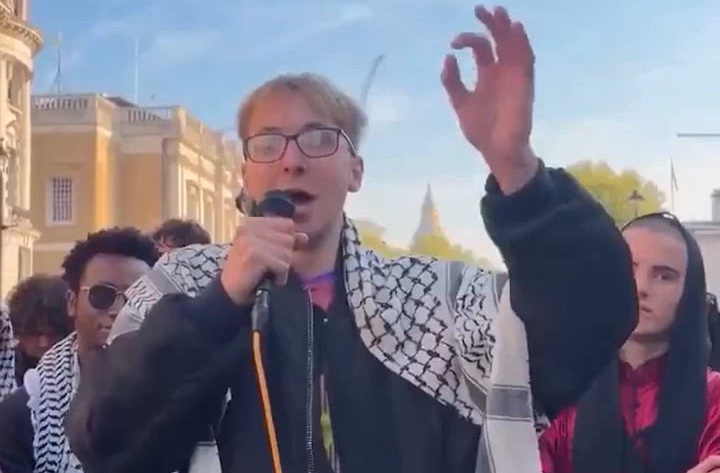‘Gaza, Gaza, make us proud, put the Zios in the ground’, Oxford student Samuel Williams appeared to chant at a central London pro-Palestine demonstration last Saturday, footage of which has since gone viral on social media.
In the early hours of Wednesday morning, a 20-year-old man presumed to be Williams (although this remains unconfirmed by the police) was arrested in Oxfordshire by the Metropolitan Police for stirring up racial hatred and held in custody. He was also suspended from Oxford University.
That we are having this conversation at all shows the grim extent of speech restrictions Brits currently suffer under
Since this is now a live case, there is a limit to what can be said, but one can of course see why the behaviour of pro-Palestine protestors has provoked outrage since the Trump-brokered ceasefire and the return of the hostages. On Saturday, they protested against peace. Meanwhile, British Jews are still in shock at the horrific Islamist terror attack on a Manchester synagogue on Yom Kippur, in which two worshippers were murdered.
In my view though the law should not be getting involved in policing speech. Two objections are practical. Is making an example of a student hothead really the best use of police time and of prison space, when burglaries go unsolved? And doesn’t this just allow misguided students to pose as martyrs to state persecution?
That we are having this conversation at all shows the grim extent of speech restrictions Brits currently suffer under. In America there is no such offence as ‘inciting racial hatred’. Stateside, the sole question is whether speech is likely to cause ‘imminent lawless action’. This is a considerably more solid, materially grounded concept than our vague, metaphorical idea of ‘stirring up’ hatred. What does ‘stirring up’ mean, precisely? And how are we defining ‘hate’? Once used sparingly, this offence has today become a dragnet for the state to go after all manner of opinions.
This grim outcome was nothing if not foreseen. As one critic of the first Race Relations Act put it in 1965, with this offence, ‘we shall be looking to the content of the words which are uttered, to the opinion, and it is the opinion, the view itself, which will be outlawed’. Ultimately, such an offence would serve to make ‘the expression of certain views unlawful even though their expression is not likely to lead to a breach of the peace’, said Ronald Bell MP.
In a free society, you should surely be able to express opinions, even odious ones, without having your collar felt. No less presciently, Bill Deedes argued that such an offence would place the police in an ‘intolerable’ position, by making them the ‘instruments of what is fundamentally a political gesture’. Sixty years after we created this inherently politicised offence, every police charging decision (or non-decision) is heavily scrutinised in case there is a whiff of double-standards.
Another problem is that to convict someone of this offence, a prosecution does not necessarily need to prove that any violence has resulted from someone’s speech, or even that it was likely to. It may only be necessary to prove that someone intended to stir up racial hatred. To do so, the justice system must interrogate and evaluate the precise sentiments and motivations behind a given bit of speech to see if they break the law: in short, it must police thought-crime.
It should worry us all that this offence, which carries a possible seven-year penalty, is being used increasingly frequently by prosecutors today. Last year there were 44 convictions, a record high (each must be signed off by the Attorney General, Lord Hermer). The charge of inciting racial hatred was used to go after Telegraph columnist Allison Pearson over a tweet criticising the police; it led to commentator Pete North being interrogated in the middle of the night over a meme; and saw Lucy Connolly sentenced to 31 months in prison over a hastily-deleted tweet. If the state is becoming increasingly trigger happy with this draconian charge, no one should be cheering it on.
Many will feel that if people on the right are being charged with this offence, then it’s only fair that it be used to go after pro-Palestine types, too. They aren’t wrong: with the justice system operating as it has, it would certainly appear to be ‘two-tier’ justice if this charge was only used against one side of the political spectrum.
But people should not be arrested over ‘hate speech’ full stop – whichever side they happen to be on. That’s why for the sake of free speech, this law needs to be repealed.







Comments